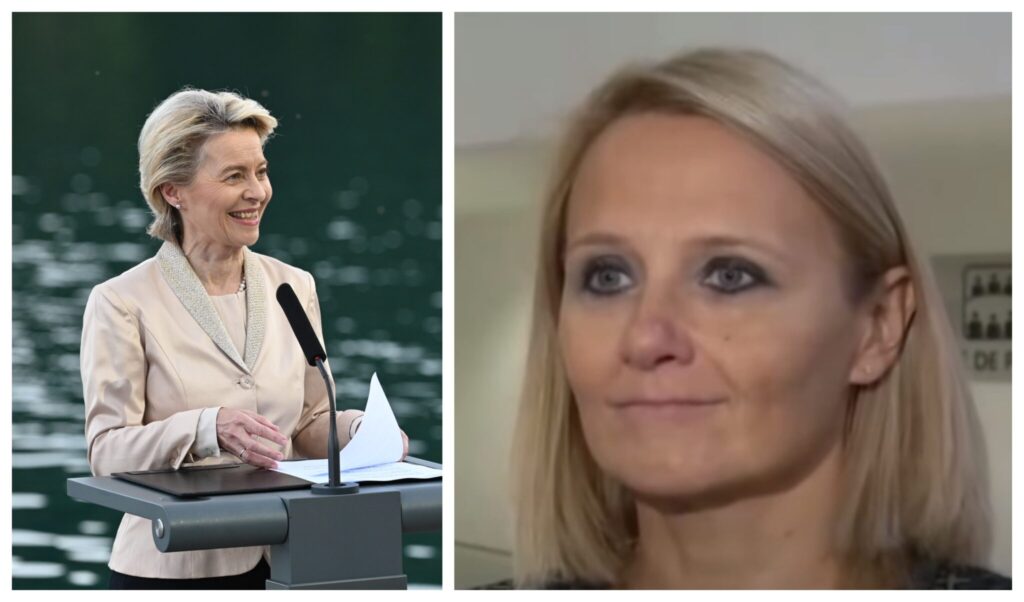Lots of people from the ranks of the opposition were happy to hear that the President of the European Commission, Ursula von der Leyen, began and ended her speech with a quote by the last President of the Communist Party of Slovenia, Milan Kučan. Namely, they are trying to use this fact to sell their story of how von der Leyen supposedly attacked the government of Janez Janša with her speech, as it is a well-known fact that Janša and Kučan are political opponents. However, even though this is self-evident to the majority of Slovenians, the same cannot be said for the President of the European Commission. She was in Slovenia for the first time on Thursday, and she has never even heard of Kučan before.
Anyone who followed the response on social media was able to see how the left-wing political option, along with the mainstream media, celebrated the fact that the President of the European Commission, Ursula van der Leyen, quoted the words of the first Slovenian President Milan Kučan twice in her speech: “Today dreams are allowed, tomorrow is a new day.” It is otherwise known that for Kučan, independent Slovenia was never the preferred option.
The niece of the important communist wrote the speech
However, if one knows that von der Leyen was in Slovenia for the first time on Thursday and did not write the speech herself, the whole thing is much more understandable. Especially because the author of the speech is Maja Kocijančič, a former adviser to Commissioner Frederica Mogherini and niece of the late “uncle from the background,” Janez Kocijančič. Years ago, Maja Kocijančič was on the list of 20 Slovenians who hold the highest positions in the EU institutions. She has worked as a spokesperson for EU foreign policy, as well as the neighbourhood policy and enlargement negotiations. She was a spokeswoman for the EU foreign policy under the leadership of the former High Representative Catherine Ashton. In addition, she was also the speaker of the Permanent Representation of Slovenia to the European Union Brussels – also during the first Slovenian Presidency of the Council of the EU, in 2008. In the past, she also worked as a journalist for the Slovenian Press Agency.
Kocijančič was already mentioned in the case of the fictional “non-paper” affair. The Serbian political show “Hit Tvit” (Hit Tweet) hosted the President of the Serbian Parliament, Ivica Dačić, the President of the non-governmental organisation Veritas, Savo Štrbac, and the film director Dragoslav Bokan. Among other things, they also talked about who could be behind the affair or who came up with the idea of this document actually existing. They mentioned that one of the influential politicians, who is also behind the “non-paper” affair and is shaping the fate of the Balkans, is also Maja Kocijančič.
Since Kocijančič herself is not active on social networks, not much is known about her private life. However, she does have a Twitter account, where she only publishes posts with EU content. We should also mention the interview that was published on the national television RTV some time ago. In it, Kocijančič said she has a great influence on the media. When asked if she felt any special power in her work, she said that she does not feel she has any special power, but she does have influence. “Especially in the media sense, because – in some parts of the world in particular, say in the Western Balkans or in our immediate neighbourhood – what I say during our daily press briefings for the journalists is very visibly resonated in the media and has very concrete responses from leaders and representatives of third countries, as well as concrete consequences for individual actions, moves, decisions.” Given that she herself said that what she says is very visibly resonated in the media in the Balkans, the question arose whether or not she might have actually launched an affair in the media – which then, of course, quickly spread further.
And her move of including a quote from Kučan in the speech of the President of the Commission certainly achieved its purpose, as it aroused the enthusiasm of the left, which organically cannot stand the government of Janez Janša. Especially in light of the fact that due to the Presidency of the Council of the European Union, many important guests have already come to and will continue to visit Slovenia. In addition to this, content that is important for Europe’s future will also be created. The current government has the necessary experience to do good work during the presidency, and the opposition is well aware of this, so they will never miss an opportunity to slander the Prime Minister and members of the current government.
Sara Kovač


